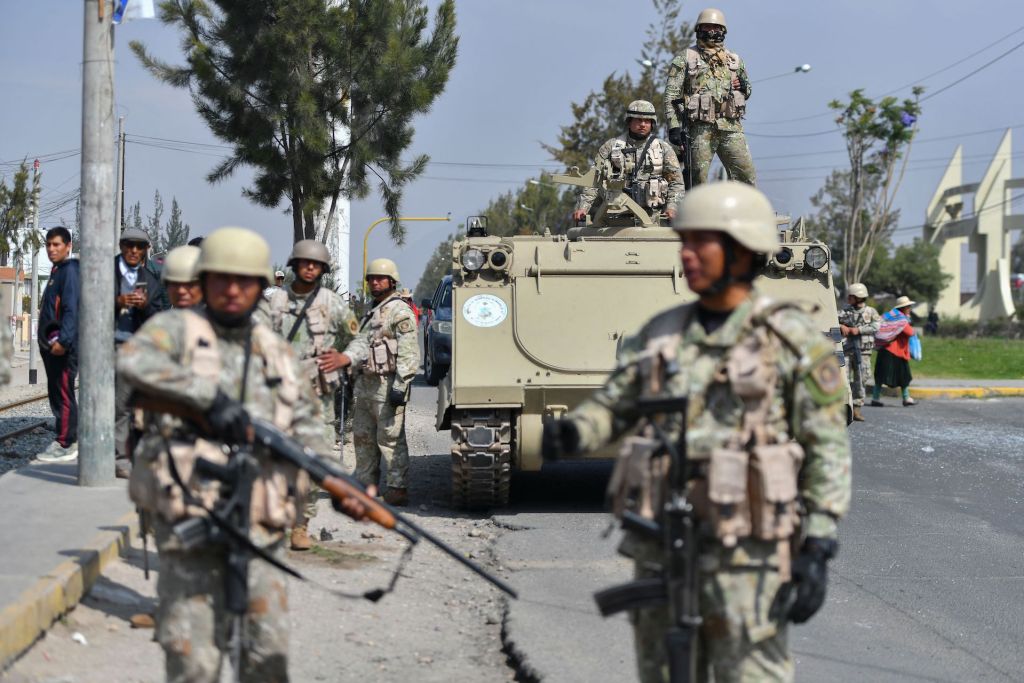The politics and energy of Latin American hacktivists Guacamaya
At a press convention in Mexico Metropolis final October, a few month after a large leak of secret authorities and navy paperwork created a home political firestorm, Mexican President Andrés Manuel López Obrador tried to downplay the following controversy. He instructed reporters his opponents failed to make use of the data in opposition to him and mocked the hacktivists behind the breach, a bunch calling itself “Guacamaya,” the Mayan title for a macaw.
“This macaw,” he said, with a wave of his hand and a wink, “has develop into a buzzard.”
Regardless of the president’s try to dismiss the hacktivists, the little-known group got here from nowhere to shake power centers across Mexico. The info dump rapidly blew up on social media and dominated headlines for weeks. A few of the most politically damaging data associated to how López Obrador apparently misled the general public about his well being, the Mexican navy’s management over the civilian authorities and the way the navy hid claims of sexual abuse in opposition to ladies. The cache of paperwork additionally contained particulars about potential public collusion with cartels and the government’s use of spyware in opposition to journalists.
Guacamaya has put Latin American governments and international companies with a Latin American presence on discover that it desires to reveal state secrets and techniques, enterprise dealings and the intimate particulars of no matter else the group deems corrupt. “Something that represents oppressive states, multinational companies and, in brief, something that helps this method of demise,” is honest sport, the group instructed CyberScoop in an e mail.

Over the course of an prolonged e mail change with the group’s official e mail deal with, CyberScoop sought to grasp extra about Guacamaya’s goals, its targets, how they perform operations and who they’re. The group most well-liked to reply to questions in Spanish, which CyberScoop then had translated.
Guacamaya has launched between 20 and 25 terabytes of stolen knowledge since March 2022, together with recordsdata it offered the nonprofit information website Forbidden Tales a 12 months prior for an exposé about corruption involving Guatemalan officers and a Swiss mining conglomerate. Their hacking operations have focused what the group says is the exploitation of indigenous lands all through Mexico and Central and South America. To date, the leaks have led to the resignation of one among Chile’s prime navy officers.
“Guacamaya is unquestionably one of the crucial accountable and impactful hacktivist teams we’ve seen in recent times,” mentioned Emma Finest, a journalist and transparency advocate who co-founded Distributed Denial of Secrets, or DDoSecrets, a nonprofit “transparency collective” that hosts hacked and leaked materials and distributes it within the public curiosity to journalists and researchers. Fuerzas Represivas — the marketing campaign revealed Sept. 19 that included greater than 13 terabytes of knowledge — ”was the biggest leak in historical past, and as an alternative of dumping the recordsdata on the open web they got here to us and Enlace Hacktivista and requested us to verify journalists and researchers had been in a position to work with the information.”
The influence in Latin and South America, Finest mentioned, “has been massive however understated, and its full impact goes to proceed to play out for months and years to return.”
THE HACKERS
It’s not clear who the hackers are, nor the place they stay. They might not reply particular questions on their backgrounds or technical skills. “We’re common folks, we’re folks from any metropolis, city, area who grew to become conscious of this device,” they mentioned. “Anybody can do what now we have completed.” They are saying their efforts are pushed by the “invasions and oppressions” Latin People have confronted through the years. And they’re making an attempt to combat again in one of the best ways they know the way — via hacking.

The group makes its leaks out there upon request both to Enlace Hacktivista — an internet site devoted to internet hosting hacked supplies and messages from hackers — or DDoSecrets. Each websites say they consider the requester earlier than offering entry. Finest mentioned requesters are evaluated on their previous work, whether or not they contribute to journalism or public analysis, and that these with imprecise targets and different considerations are denied. Enlace Hacktivista didn’t reply to a request for remark.
The members of Guacamaya with whom CyberScoop communicated mentioned they’re conscious of the widespread hypothesis about their identities and on whose behalf they function. The group’s critics have questioned whether or not they’ll assault solely left-wing governments and have accused them of working with the CIA, they mentioned. “It appears to us like a want to distract and to lose our message in these discussions,” they mentioned. “We discover an angle of disbelief after we say that we’re bizarre folks. They’re shocked and don’t imagine within the capability of our communities, of us, widespread folks. They solely imagine within the capability of nice powers. That’s how they’ve dominated us, utilizing denigration and humiliation.”
With every hack, Guacamaya publishes a prolonged treatise, all of which have hit the same theme: The company and authorities energy buildings all through Abya Yala — an indigenous time period for the American continent in its entirety — allow an exploitative and violent system that ensures the subjugation, abuse and distress of native populations in service of American and European capitalists.
“The police entities of Abya Yala, like the military, are armed entities that assure oppression, injustice and terror in opposition to the peoples, guaranteeing the dispossession of the land of peasants, indigenous and Afro-descendant folks,” the group wrote in the message posted with Fuerzas Represivas, or Repressive Forces, the discharge that contained six terabytes of Mexican navy paperwork. “They assure extractivism. They assure neoliberal and capitalist programs.”
The group additionally posts messages about their operations and their justifications for carrying them out on Enlace Hacktivista and DDoSecrets. A evaluate of the communiques, in addition to the correspondence with CyberScoop, suggests a number of authors both collaborating or penning the person messages. The group confirmed the variety of its membership in a message: “Cierto, no somos ni una persona ni un pueblo sino muchos pueblos,” they mentioned. We’re neither one individual nor one folks however many peoples.
Juan Andrés Guerrero-Saade, senior director of SentinelLabs and a former senior cybersecurity and nationwide safety adviser to the federal government of Ecuador, agreed that almost all analysts or officers count on operations reminiscent of these, with main outcomes, to have connections to nation-states or felony syndicates.
“For these of us who’ve grown accustomed to nation-state performs, or felony performs that finally have some semblance of a objective and count on some type of [return on investment], it’s that a lot more durable to grasp somebody who says, ‘Nicely, you recognize, we’re simply doing this as a result of f— you, that’s why,” he mentioned.
Moreover, many risk researchers are typically unfamiliar with Latin America’s political and socio-technical context. The area is “notably underserved on all issues cyber, whether or not protection in opposition to prolific and long-running cybercrime or nation-state operations, each native and from overseas, Guerrero-Saade mentioned. “Latin America isn’t being prioritized or properly served,” he mentioned, on account of quite a lot of causes reminiscent of funds and complicated native context. “In the event you’re not there, for those who don’t care, for those who don’t know what’s occurring, it’s very exhausting to do this correctly.”
Gabriella Coleman, an anthropology professor at Harvard who’s studied and written extensively about hacker tradition, mentioned that though it’s notoriously tough to know actually who’s behind these sorts of operations, “aesthetics and magnificence really might make an actual distinction.”
Guacamaya pairs its leaks with movies, vivid illustrations that evoke indigenous art work and music, alongside the messages for each hack. The movies embrace catchy hip hop, with lyrics flicking at revolutionary and people-powered themes with a touch of hacking sprinkled all through. “A whole lot of care went into the music,” the group instructed CyberScoop.
The “political and aesthetic sensibilities” of the group are entrance and middle of their public pronouncements, Coleman mentioned. “In that sense, I feel that these actually are genuine political activists coming from the bottom up, as opposed from the highest down.” For example, she mentioned, their type demonstrates a deep understanding of Latin American tradition and political ideology. In some ways, their method resembles the work of Phineas Fisher, a leftist hacktivist maybe greatest identified for focusing on digital surveillance corporations.
For Tom Uren, previously of the Australian Alerts Directorate and a present editor with Significantly Dangerous Enterprise cybersecurity information, assessing hacktivism claims comes all the way down to “does what they hack and what they leak really line up with what they are saying, and does that line up with their capabilities and the vulnerabilities they’ve claimed to use.
“On all these metrics, Guacamaya just about appears genuine,” Uren mentioned. “Normally, the state-backed teams, they don’t trouble to make such a superb effort,” he added. “There’s no cause a state backed group couldn’t make an effort, it’s simply that they usually don’t trouble.”
THE HACKS AND IMPACT
Whereas the group’s hack-and-leak operations have gained international consideration, actual world penalties are more durable to evaluate. Essentially the most direct and high-profile influence occurred in Chile, the place Gen. Guillermo Paiva Hernández, head of the nation’s Joint Chiefs of Workers, resigned in September over the embarrassment of the leak.
Officers in Peru tried to quash protection of the leaks there. A Peruvian navy official threatened to carry treason prices in opposition to Ernesto Cabral, a journalist with the impartial Peruvian information outlet La Encerrona, when he initially reported on the fabric, the reporter instructed CyberScoop.
La Encerrona wrote extensively about Guacamaya’s Peruvian leaks, covering revelations the Peruvian navy had been monitoring left-wing events and particular left-wing figures as threats to the state. The recordsdata additionally revealed that the Peruvian navy deemed civil organizations within the area a risk as a result of they “infiltrate and advise the inhabitants in opposition to mining,” La Encerrona tweeted, in line with a Google translation.
Cabral mentioned journalists and NGOs in Peru are actually extra cautious with their communications after the navy recordsdata revealed in depth monitoring of reporters. General, the response among the many public and the politicians has been blended, he mentioned.
“Nearly all of the politicians right here, the lawmakers and in addition the president, they agree that this type of conduct from the navy and police is OK, there isn’t something incorrect in doing it,” Cabral mentioned. “That was additionally one of many major responses we had, at the least on social media, from plenty of residents.” Cabral famous that an earlier hack-and-leak operation focusing on Peruvian regulation enforcement data in April 2022, allegedly carried out by a person affiliated with the Conti ransomware gang, had already begun to disclose authorities misdeeds, maybe dulling the general public response to the Guacamaya operation.
However there was “main protection from plenty of newsrooms” throughout the nation, he mentioned. “As a result of the military was focusing on their politicians, their representatives, the NGOs working within the south of Peru supporting the neighborhood in opposition to what they name misbehaviors of the mining corporations,” he mentioned. “So it was related for them.”
A giant a part of the story, Cabral famous, was that the Guacamaya recordsdata revealed data that “threatened the lives” of Peruvian troopers battling drug trafficking organizations. This was one of many the explanation why Cabral and another journalists had been pissed off when the Peruvian navy tried to downplay the data. “There may be delicate data,” he mentioned. “Info that may be harmful, not just for the NGOs or the civil society, however for the troopers.”

Related security considerations surfaced in Australia. In October, the Sydney Morning Herald reported that the leaks associated to Colombia “uncovered the identities and strategies of secret brokers working to cease worldwide drug cartels from working in Australia.” Particulars from 35 Australian Federal Police operations, some ongoing, had been leaked, and “many abroad police companies had been additionally affected,” the paper reported.
An AFP spokesperson instructed CyberScoop in a press release that the company is “involved about doable breaches of operational safety as a consequence of this knowledge compromise.” Moreover, the company is “assessing the data which will have been obtained from Colombian regulation enforcement as a part of this hacking exercise,” and is working with “worldwide companions” and Colombian regulation enforcement to “safeguard their pc programs.”
The group does seem to think about the potential hurt. For example, Guacamaya required anybody who needed the Fuerzas Represivas dataset to immediately request entry to it. In a message posted alongside the Mexican military documents, the group mentioned it needed “everybody to have entry to the leak,” however that was not doable “since there may be data that within the palms of drug traffickers may put many individuals in danger.” Even nonetheless, the supplies had been shared with a number of journalists, the group mentioned, “whether or not we like [their] politics and [their] reporting or not.”
In Chile, reporters used the paperwork to reveal Peru’s contingency plans for potential war with Chile. “Every little thing is there, from the trajectories that the models would comply with, to the deception methods that will be applied to distract the Chilean forces,” Chile’s Heart for Journalistic Investigation reported. In a separate story, the center reported on “highly sensitive” files associated to Colombia’s navy and political relationship to the U.S., Washington’s fears about Chinese language affect in South America and obvious Russian navy communications programs working in Venezuela close to the Colombian border.
The leaks additionally revealed detailed coordination between U.S. and Mexican armed forces within the combat in opposition to drug trafficking, El País reported in October. The recordsdata confirmed that though Mexican President López Obrador “might have mentioned that Washington has not been concerned within the current offensives in opposition to organized crime, the 2 international locations have been working carefully collectively,” the paper reported.
In Mexico, it is going to take months or maybe years for the data contained in leaks to be verified and reported by journalists or researchers, and this has contributed to tales from the leaks largely petering out, mentioned Hiram Alejandro the co-founder and CEO of cybersecurity agency Seekurity in Mexico Metropolis. Many reporters aren’t technically outfitted to entry the massive quantities of knowledge and parse it for tales, or they don’t wish to press too exhausting on delicate data on condition that Mexico is among the most harmful locations on the earth for journalists. And the Mexican authorities’s downplaying of fabric included within the leaks has additional diminished the story’s momentum.
In line with Alejandro, a “well-known” Mexican reporter who instructed him that they needed to dig deeper into the recordsdata, however they didn’t wish to put themselves at risk. Exposing each delicate data and the dearth of fundamental cybersecurity may assist Mexico’s adversaries assault the nation, or steal data.
Alejandro and his journalist mates aren’t the one ones mentioning the difficulties many native reporters face making an attempt to cowl the leaks, whether or not in Mexico, Peru, Chile, Colombia or elsewhere in Latin America.
Guacamaya additionally acknowledges the risks. In its first interview, the group told Forbidden Stories’ Laurent Richard that one of many causes it shared its first hack with the French-based consortium was as a result of “being a world media made it much less dangerous,” and that “sending it to the native press would put them in danger as a result of they’ve already been imprisoned or threatened.” Exposing Mexican navy paperwork may reveal particulars about operations in opposition to drug traffickers, Guacamaya mentioned, and “put many individuals in danger.”
Guacamaya declined to say whether or not extra leaks are coming — ”we’re some issues, we are able to’t say extra” — but additionally mentioned they aren’t anxious about governments they’ve uncovered, or companies they’ve embarrassed, to return again at them. “We’re the folks whose rights have already been violated and in opposition to whom these states, this oppressive system in all facets, have exercised every kind of abuses,” they instructed CyberScoop. “We have no idea if they will do extra to us. We doubt it.”
Source link
